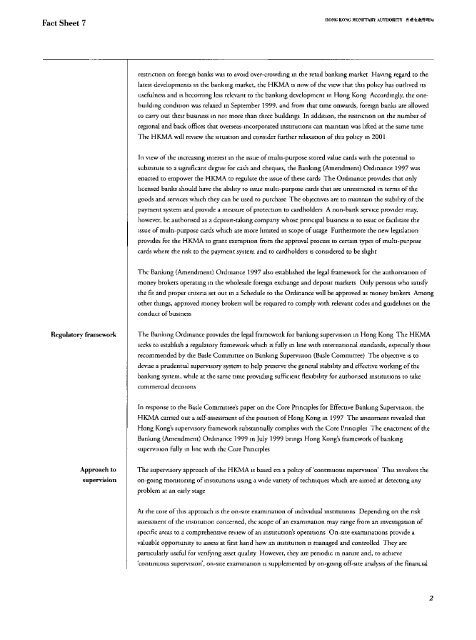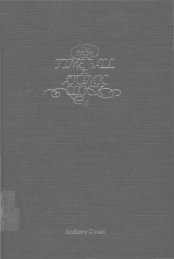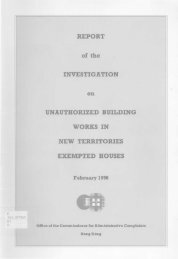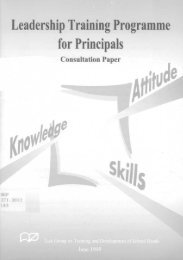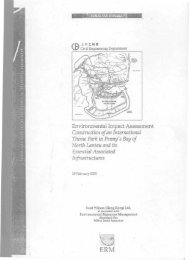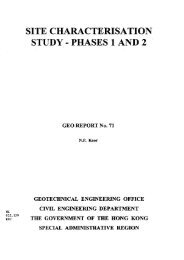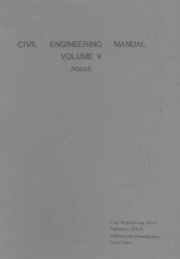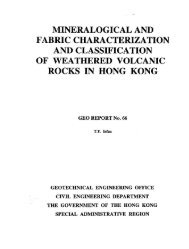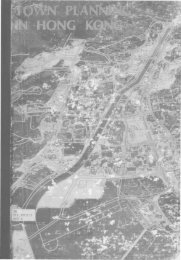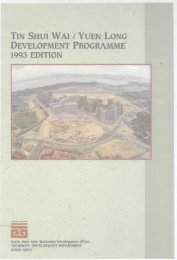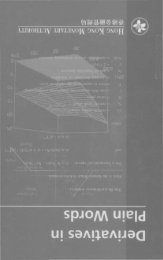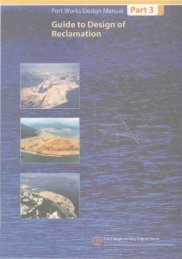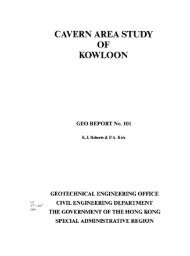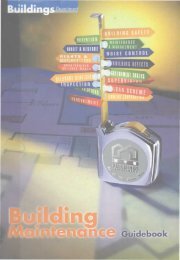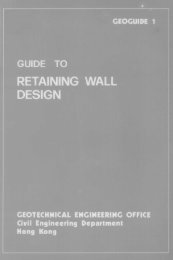HONG - HKU Libraries - The University of Hong Kong
HONG - HKU Libraries - The University of Hong Kong
HONG - HKU Libraries - The University of Hong Kong
Create successful ePaper yourself
Turn your PDF publications into a flip-book with our unique Google optimized e-Paper software.
Fact Sheet 7<br />
<strong>HONG</strong> KONG MONETARY AUTHORITY<br />
restriction on foreign banks was to avoid over-crowding in the retail banking market Having regard to the<br />
latest developments in the banking market, the HKMA is now <strong>of</strong> the view that this policy has outlived its<br />
usefulness and is becoming less relevant to the banking development in <strong>Hong</strong> <strong>Kong</strong> Accordingly, the onebuilding<br />
condition was relaxed in September 1999, and from that time onwards, foreign banks are allowed<br />
to carry out their business in not more than three buildings In addition, the restriction on the number <strong>of</strong><br />
regional and back <strong>of</strong>fices that overseas-incorporated institutions can maintain was lifted at the same time<br />
<strong>The</strong> HKMA will review the situation and consider further relaxation <strong>of</strong> this policy in 2001<br />
In view <strong>of</strong> the increasing interest in the issue <strong>of</strong> multi-purpose stored value cards with the potential to<br />
substitute to a significant degree for cash and cheques, the Banking (Amendment) Ordinance 1997 was<br />
enacted to empower the HKMA to regulate the issue <strong>of</strong> these cards <strong>The</strong> Ordinance provides that only<br />
licensed banks should have the ability to issue multi-purpose cards that are unrestricted in terms <strong>of</strong> the<br />
goods and services which they can be used to purchase <strong>The</strong> objectives are to maintain the stability <strong>of</strong> the<br />
payment system and provide a measure <strong>of</strong> protection to cardholders A non-bank service provider may,<br />
however, be authorised as a deposit-taking company whose principal business is to issue or facilitate the<br />
issue <strong>of</strong> multi-purpose cards which are more limited in scope <strong>of</strong> usage Furthermore the new legislation<br />
provides for the HKMA to grant exemption from the approval process to certain types <strong>of</strong> multi-purpose<br />
cards where the risk to the payment system and to cardholders is considered to be slight<br />
<strong>The</strong> Banking (Amendment) Ordinance 1997 also established the legal framework for the authorisation <strong>of</strong><br />
money brokers operating in the wholesale foreign exchange and deposit markets Only persons who satisfy<br />
the fit and proper criteria set out in a Schedule to the Ordinance will be approved as money brokers Among<br />
other things, approved money brokers will be required to comply with relevant codes and guidelines on the<br />
conduct <strong>of</strong> business<br />
Regulatory framework<br />
<strong>The</strong> Banking Ordinance provides the legal framework for banking supervision in <strong>Hong</strong> <strong>Kong</strong> <strong>The</strong> HKMA<br />
seeks to establish a regulatory framework which is fully in line with international standards, especially those<br />
recommended by the Basle Committee on Banking Supervision (Basle Committee) <strong>The</strong> objective is to<br />
devise a prudential supervisory system to help preserve the general stability and effective working <strong>of</strong> the<br />
banking system, while at the same time providing sufficient flexibility for authorised institutions to take<br />
commercial decisions<br />
In response to the Basle Committee's paper on the Core Principles for Effective Banking Supervision, the<br />
HKMA carried out a self-assessment <strong>of</strong> the position <strong>of</strong> <strong>Hong</strong> <strong>Kong</strong> in 1997 <strong>The</strong> assessment revealed that<br />
<strong>Hong</strong> <strong>Kong</strong>'s supervisory framework substantially complies with the Core Principles <strong>The</strong> enactment <strong>of</strong> the<br />
Banking (Amendment) Ordinance 1999 in July 1999 brings <strong>Hong</strong> <strong>Kong</strong>'s framework <strong>of</strong> banking<br />
supervision fully in line with the Core Principles<br />
Approach to<br />
supervision<br />
<strong>The</strong> supervisory approach <strong>of</strong> the HKMA is based on a policy <strong>of</strong>'continuous supervision' This involves the<br />
on-going monitoring <strong>of</strong> institutions using a wide variety <strong>of</strong> techniques which are aimed at detecting any<br />
problem at an early stage<br />
At the core <strong>of</strong> this approach is the on-site examination <strong>of</strong> individual institutions Depending on the risk<br />
assessment <strong>of</strong> the institution concerned, the scope <strong>of</strong> an examination may range from an investigation <strong>of</strong><br />
specific areas to a comprehensive review <strong>of</strong> an institution's operations On-site examinations provide a<br />
valuable opportunity to assess at first hand how an institution is managed and controlled <strong>The</strong>y are<br />
particularly useful for verifying asset quality However, they are periodic in nature and, to achieve<br />
'continuous supervision', on-site examination is supplemented by on-going <strong>of</strong>f-site analysis <strong>of</strong> the financial


